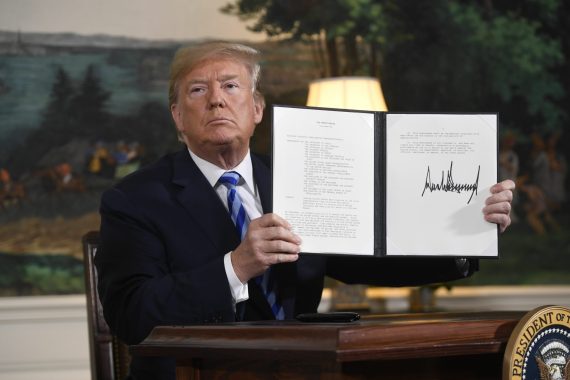President Trump announced the withdrawal of the U.S. from the Iran Nuclear Deal. This brief will shed light on several legal implications arising from this historic decision by the Trump administration. First, while the Iran Nuclear Deal connotes an international agreement signed by six states and the Islamic Republic Iran, it does not have the same legal features as an international agreement does under international law. It is a mere political commitment, as opposed to a legally binding international agreement. Former President Barack Obama made considerable efforts to strike this deal. However, he followed the procedure to adopt the deal as an executive agreement, rather than a treaty passed by the Senate. Therefore, this facilitated his successor to withdraw from the agreement, specifically at the international level. Nevertheless, the Trump administration would not have been legally bound to continue with the deal, even if it had been adopted as a treaty.
So, how does the current legislation define the scope of the sanctions regime? Section 3 of the presidential memorandum signed on May 8 provides a to-do-list for the State Department and Treasury Department. According to this section, several executive orders will be “re-issued,” and individuals on the sanction lists will be “re-listed.” The government will re-register more persons and entities on the list of Specifically Designated Nationals (SDN), and this will require more enforcement effort. It will be more likely that a company, whether in the U.S. or overseas, appears on the radar unless they cut their commercial relations with Iran. These increased enforcement efforts can result in more cases that are brought against entities, banks, and companies.
The direct effect against Iranian nationals and entities in the U.S. is not anticipated to be much, since the withdrawal decision was not a surprise for them. They can move all of their assets from U.S. jurisdiction, limiting the territorial effect of the decision. However, the adverse effect will be dramatic for Europe, since U.S. enforcement authorities are not reluctant to exercise their jurisdiction over individuals and entities overseas. The withdrawal decision allows them no option but to cut off their commercial relations with Iran. The memorandum issued on May 8 explicitly instructed the State and Treasury Department “to [prepare the] guidance necessary to educate United States and non-United States business communities on the scope of the prohibited and sanctionable activity.” Hence, the government will make additional efforts to assist business communities around the world to adapt to the changes.
While U.S. authorities will attempt to implement a detailed plan to revive the sanctions against Iran, it is not clear how this will produce far-reaching effects on non-U.S. business. For instance, the high amount of fines will not only jeopardize business, but also create additional political conflict between European countries and the U.S. One notable example was the fine imposed against BNP Paribas in 2014. The amount of the fine did not only harm the French financial system, it caused tension between former presidents Obama and François Hollande. If the scope of the sanctions will be wide, there is much more possibility that this kind of conflict will occur again between Europe and the U.S. If individuals attempt to circumvent the sanction rules by committing other ‘crimes’ under U.S. law, such as conspiring to defraud the U.S., or bank fraud, they are likely to sit as defendants in a criminal trial.
The Iran Deal plays a particular role for Europe, and the trade between Iran and the EU considerably increased after signing the deal in 2015. The efforts made by European leaders, namely President Emmanuel Macron and Chancellor Angela Merkel, stem from interest in their commercial ties with Iran. These efforts include the meetings held in Washington D.C. to convince President Trump to save the deal. On 8 May 2018, European leaders promptly reacted to the decision made by President Trump. President Macron underlined the significant interest in preserving the nuclear non-proliferation regime. In a similar vein, German Foreign Minister pointed out the risk of jeopardizing the long-term relations between Europe and the U.S. Foreign Minister of the U.K., Boris Johnson, expressed his regrets of this decision. A week after the decision of May 8, several European politicians met the Foreign Minister of Iran in order to devise an effective plan. For instance, Federica Mogherini, the High Representative of the EU, expressed their willingness to carry out determined work to keep the commitments of the deal.
Recommended
From a legal point of view, the withdrawal decision does not force any other parties to quit, but the abovementioned extraterritoriality will hamper the ability of others to comply with the deal in practice. For this reason, the European Union plans to use other means to keep the deal alive. For instance, the EU might impose the notorious “blocking regulations.” These regulations, which were adopted in 1996, are intended to protect European companies from the “extra-territorial application of legislation adopted by a third country.” In the past, it was considered effective against the extraterritorial sanctions imposed against Cuba by the U.S.
Another option could be the change of currency. EU members could carry on their trade with Iran by using the Euro, so that U.S. authorities will be less likely to exercise their jurisdiction over these transactions. The rationale behind the extraterritorial application of the sanction regime is that U.S. authorities need to establish the link between an extraterritorial transaction and territory of the U.S., and, once a transaction is made in U.S. dollars, it is sufficient for the U.S. government to exercise its jurisdiction based on this link. The single fact that a bank processes U.S. dollar transactions means that this bank is on the radar of U.S. enforcement authorities, as observed in the case of PNB Paribas. If this bank fails to comply with the sanction regime as part of the domestic law of the U.S., authorities will impose a fine on this bank. In order to mitigate the loss and escape from U.S. jurisdiction, the change of currency offers a useful alternative for the EU, albeit the business between these countries is unlikely to take any legal or financial risk. Similarly, the EU can take the Indian investments in Iran, which are made in the currency of Indian rupee.
Moreover, as the spokesman of the French government suggested, the EU could challenge this withdrawal decision at the World Trade Organization (WTO) Dispute Settlement Unit by arguing it would adversely affect the trade between WTO members. In this case, the EU could attempt to resolve this issue as a trade dispute. Although they could make reasonable arguments before the WTO, a ruling from a panel may not produce an effect powerful enough to force the Trump administration to reconsider the future of the Iran deal.
The U.S. decision will undoubtedly affect Turkey as a major trade partner of Iran. Similar to the EU, this decision can decrease the trade volume between the two countries. Turkish politicians read the situation from the same page, and Turkey is likely to join the resistance against the U.S. decision. From a legal point of view, due to the uncertainty of a criminal trial brought against two Turkish citizens, namely Reza Zarrab and Hakan Atilla, Turkey will act cautiously in their commercial ties with Iran, at least in the early stage of re-instituting sanctions against Iran.
It is most likely that these possible actions within international law are largely ignored by the Trump administration. In his speech, he did not explicitly refer to any issues arising from international law. For example, the future of the United Nations Security Council Resolution 2231 remained unaddressed. While the Trump administration’s decision may cause increased conflict with Europe, the disregard for the international community’s interests and laws was not a complete surprise for the international community, and neither was the Trump administration’s withdrawal from the Iran Nuclear Deal.





